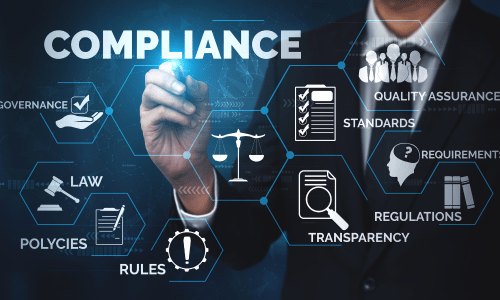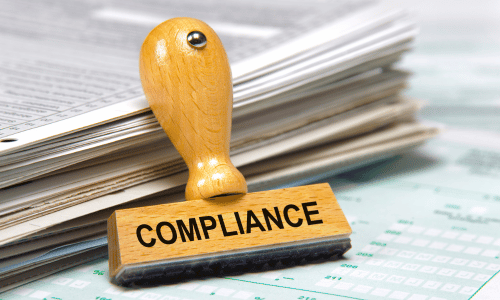
In the complex landscape of business, adhering to legal and regulatory obligations is not just important; it’s absolutely imperative. Legal compliance ensures that companies operate safely, ethically, and within the boundaries of the law. Key areas to address in this realm involve understanding legal requirements, effectively managing contracts, and protecting intellectual property.
Understanding Compliance Obligations

A fundamental step in legal compliance is understanding the myriad of obligations your business needs to meet. These obligations span federal, state, and local levels and touch upon various aspects of your operations. Here are some key areas to know:
Business Licenses
- Ensure that you have the necessary business licenses and registrations to operate legally in the jurisdictions where your business has a presence. This includes registering your business name and obtaining the required tax IDs.
Tax Requirements
- Fulfil your tax obligations, including income taxes, employment taxes, excise taxes, and sales tax, at the federal, state, and local levels. It’s crucial to understand tax deductions and credits that can benefit your business.
Labor Laws
- Abide by labour laws that cover a wide range of topics, including minimum wage, overtime pay, anti-discrimination measures, workplace safety, family leave, and regulations related to hiring foreign workers.
Workplace Regulations
- Ensure compliance with various workplace regulations, such as building occupancy codes, ADA accommodations, sexual harassment prevention, fair hiring practices, OSHA safety rules, and more.
Industry Regulations
- If your business operates in a heavily regulated industry, such as healthcare, financial services, transportation, or manufacturing, it’s essential to be aware of and comply with industry-specific legal obligations.
Product Regulations
- If your business produces physical goods, adhere to applicable product testing, labelling, warning, and recall regulations to ensure the safety and compliance of your products.
Insurance Requirements
- Carry any mandatory insurance policies, such as workers’ compensation, unemployment, and auto liability insurance, if they are applicable to your business.
Data Privacy
- If your business handles customer data, follow data protection, disclosure, and security regulations, such as the GDPR and CCPA, to safeguard sensitive information.
Regularly consulting with legal counsel is essential to ensure that you remain aware of and compliant with current legal obligations at all levels of your operations, workforce, and industry. Violations of these obligations can lead to lawsuits, fines, and significant disruptions to your business.
Managing Contracts Effectively

Contracts are the cornerstone of business relationships, whether with vendors, partners, employees, or customers. Effectively managing contracts is crucial. Here are some best practices:
Professional Assistance
- Use experienced business attorneys to draft customized agreements tailored to your specific needs. Seek professional review before signing contracts proposed by other parties.
Precise Terms
- Ensure that contracts contain precise terms, including clearly defined expectations for services or products, pricing and payment details, quality and delivery guarantees, timeline expectations, and rollout plans.
Intellectual Property
- Clearly outline intellectual property ownership if applicable, specifying whether licensing or sharing of IP is involved.
Legal Clauses
- Include clauses that clarify legal liability, indemnification, insurance obligations, and dispute resolution processes.
Confidentiality and Non-Compete
- Depending on the nature of the relationship, include confidentiality, non-compete, and non-disclosure clauses to protect proprietary information and business relationships.
Renewal and Termination
- Establish provisions for contract renewal, termination, and buyout. Address possible changes in ownership.
Review and Negotiation
- Carefully review proposed contracts, and don’t hesitate to negotiate for better terms if necessary. Always have legal counsel review contracts before signing.
Once a contract is signed, it becomes legally binding, protecting your interests and providing recourse if the terms of the agreement are not upheld.
Safeguarding Intellectual Property

Intellectual property (IP) is a valuable asset for many businesses, and protecting it is essential. Here are ways to safeguard your intellectual property:
Copyrights
- File for copyrights for original creative works, such as written content, artwork, photographs, videos, and software code. This prohibits unauthorized reproduction of these works.
Trademarks
- Protect logos and unique brand names associated with your business and offerings. This helps build brand identity and recognition.
Patents
- File for patents to protect proprietary inventions and processes from being copied. Patents provide exclusive rights to commercialize these inventions.
Trade Secrets
- Safeguard critical proprietary data and information by entering into non-disclosure agreements with staff and partners to keep this information confidential.
Domain Names
- Register website domain names related to your brand identity and offerings to prevent cybersquatting and protect your online presence.
Additionally, it’s crucial to remove metadata and enable digital rights management on files to protect your online intellectual property. In case of IP theft, report it through proper legal channels, which may involve sending cease-and-desist orders or pursuing litigation if infringement persists.
In summary, legal compliance is a fundamental aspect of operating a business safely and ethically. It involves understanding and adhering to a wide range of legal obligations, effectively managing contracts, and protecting your valuable intellectual property. Seeking ongoing legal counsel from qualified business attorneys is an investment that ensures your business operates within the boundaries of the law and safeguards your interests. Legal compliance is not just a necessity; it’s a cornerstone of responsible business operations.
We’ve unpacked a lot today at Biz Step Ladder, and now it’s your turn to add to the dialogue. Do you have insights or experiences that could expand on what we’ve discussed? Perhaps you’ve identified an angle we haven’t covered. Jump into the conversation below with your comments and let’s continue the learning journey together. Your input is not just welcome—it’s a vital part of our community’s growth. So, what are your thoughts? Share them below and let’s enrich our business wisdom collectively!
Discover related content by exploring Starting a business, common pitfalls, and resources for new entrepreneurs.





